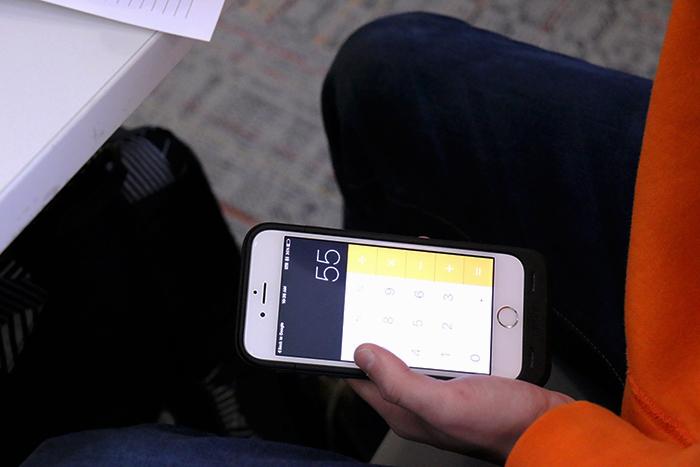Consequences of cheating vary
A student uses his cell phone as a calculator while completing math homework that was to be completed without a calculator.
February 5, 2016
The temptation to cheat is ever present in the lives of high schoolers. “Will it really hurt to peek at the answer sheet so alluringly placed in my field of vision?” “I can’t possibly get caught if I search an answer on my phone just one time!”
Such excuses are always made when the common question of whether or not to cheat arises, but when considering the action, morality placed aside, the verdict is clear: cheating is stupid.
The consequences range from a zero on the given assignment to suspension or expulsion from college, which may seem harsh, but it makes sense. Schools give out clear warnings at the beginning of every school year, and students are expected to take the messages seriously because these policies are truly for the good of the student.
“The top engineers at Cummins are there not because they cheated, but because they’re incredibly bright.”
“They got those good grades by working, not by getting other kids to find the answers,” said Kevin Darr, who teaches Chemistry and Biology at East.
The East Student Handbook gives a fair warning as it states, “Academic integrity entails a firm adherence to a set of values grounded on the concept of honesty with respect to the intellectual efforts of oneself and others. It observes basic honesty in one’s work, words, ideas and actions. Academic integrity is a commitment to not lie, cheat or steal in academic endeavors”.
When a cheater is caught, the school’s academic dishonesty policies go into action, and the student could fail the assignment or the course, depending on student’s previous actions.
Still, there are always consequences for cheating; none of them benefitting the student at hand’s grades or reputation.
There are also strict rules regarding cheating on standardized tests like the SAT, PSAT and ACT and AP tests. If a student is suspected, which is most often because of a cell phone alert, test proctors must find proof before confiscating the test, which will then not be scored.
While this may not seem too harsh and does not affect grades, it could result in a little less pocket money for students or parents, because after the test, which is often necessary to take for college applications, is confiscated, students have to pay to take it again. And when parents have to give extra money for something they were only expecting to pay for once, it rarely ever results in a boost in their student’s happiness.
Perhaps the least mentioned, but most significant form of cheating is plagiarism. Plagiarism is when someone else’s work or ideas are credited as one’s own, most often encountered when students fail to cite their sources when writing papers.
The East English Department’s policy states that the first offense is automatic failure of that assignment as well as parent contact, while the second is semester failure, which differs from the general cheating rule of quarter failure after two offences. It is also less extreme than the procedures in place at most colleges.
At the collegiate level, plagiarism always results in withdrawal from the class or academic probation, and sometimes even expulsion from the school.
This means that the large sum of money given to the school cannot be refunded, putting students in a precarious position financially that may threaten their future education or career. Furthermore, if the original author of the work in question were to notice the plagiarism, they have to right to sue for copyright infringement and ask for substantial amounts of money in return.
Bad habits obtained in high school are what lead to extreme consequences of cheating in higher education, and they need to be refuted before more than your GPA is put in harm’s way. So next time you’re taking a test and the ease of peeking over at your classmate’s answers comes to mind, think of your grades, your reputation, your wallet, and your future.







